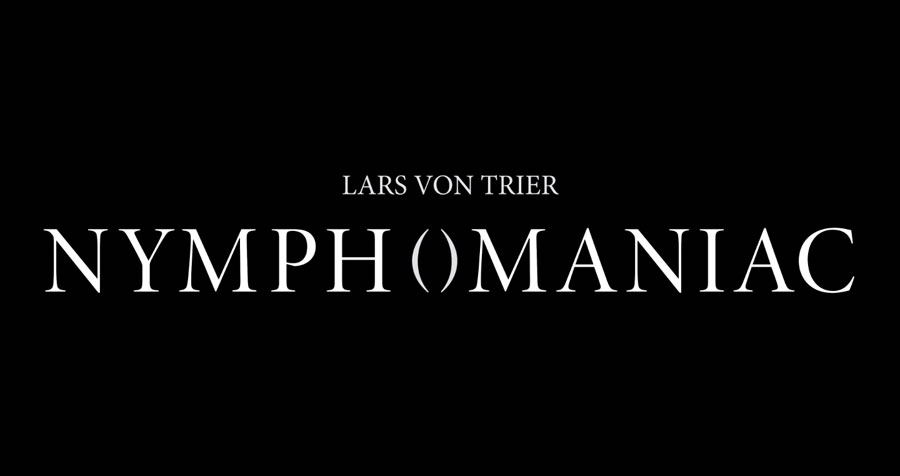Nymphomaniac
Written and directed by Lars von Trier
Denmark, Belgium, France, and Germany, 2014
Lars von Trier will never change, nor should he. Being a showman at heart, his career and image have been referred to as both serious and preposterous, and his latest work, Nymphomaniac, will not settle the debate, as it embodies the kind of wink-wink self-indulgence detractors loath, while providing enough intellectual insight and cinematic energy to be a worthy entry in the director’s already impressive oeuvre. In fact, Nymphomaniac is best viewed as a von Trier highlight reel, where aspects of his previous work are combined and referenced.
Starring a never-better Charlotte Gainsbourg as the sex-addicted Joe (Stacy Martin plays the younger Joe), Nymphomaniac opens to the sound of dribbling water playing over an empty black screen, and the moment is one part cheeky symbolism, one part atmosphere; von Trier setting the stage for the long and joyless though not entirely somber story of Joe’s sexual addiction—or nymphomania, as she prefers to call it.
Many people—including the American Psychiatric Association—will tell you sex addiction is not a real disorder. Von Trier clearly disagrees. However, Nymphomaniac is not designed to combat the naysayers, or make any definitive claims concerning the causes or particulars of sex addiction. Instead, it is a character study of a woman trying to address and flesh out past behavior; and while Joe is quick to blame herself, von Trier eagerly points a finger at the oppressive nature of patriarchal society.
Unnecessarily split into two parts—one of many similarities to Tarantino’s Kill Bill—Nymphomaniac is structured in a mostly linear fashion. Having been found laying unconscious in an alleyway by the intellectually minded Seligman (Stellan Skarsgard), Joe spends the evening reciting her sexual past in 8 chapters. Seligman, the eager listener, is not without agency, though. His constant digressions are used to compare and contrast Joe’s learned experience with his intellectual method. From fly fishing to the whore of Babylon, he tries to place Joe’s story in the context of scholarship, and it is this dynamic that drives the film forward. Joe and Seligman are opposites, yet it is obvious where von Trier’s allegiance stands.
 While Seligman is a learned man, he is not smarter than Joe, nor is he a more reputable human being. In some ways, he is a stand-in for patriarchy, acting as if he can tell Joe what her life means. He pretends to be an understanding listener, yet judges and over-explains everything as if she can’t figure it out for herself, even scolding her for using words like “Negro,” and for defending a repressed pedophile—in what is the film’s most thought-provoking and insightful sequence.
While Seligman is a learned man, he is not smarter than Joe, nor is he a more reputable human being. In some ways, he is a stand-in for patriarchy, acting as if he can tell Joe what her life means. He pretends to be an understanding listener, yet judges and over-explains everything as if she can’t figure it out for herself, even scolding her for using words like “Negro,” and for defending a repressed pedophile—in what is the film’s most thought-provoking and insightful sequence.
At times, the back and forth between Joe and Seligman feels oddly like von Trier getting off on his own writing as he plays out conversations from his mind—and he is, but, like everything else in the film, he is well aware of what he’s doing; Nymphomaniac being a highly calculated work, meant to agitate, challenge, and play with audience expectation. Never mind the trailer or the press conferences focusing on the hardcore sex scenes: the backbone of this film has little to do with plot and everything to do with the nature of storytelling.
We have no idea if Joe is telling the truth, nor does it matter. What matters is the why. Why does she feel the need to tell this story? While admitting her only sin was “demanding more from the sunset,” she now seems intent on expressing herself through verbal communication. For, if even half of her story is true, she spent most of her life keeping her thoughts away from others. Even with her father, she merely listened and catered to his happiness by encouraging him to recite his passions over and over again. And as she grew older, she tried to find—and lose—herself through sex, an empty tactic she’s now coming to grips with. By sharing her sexual past, she can elicit control over the information, often calling out Seligman for misunderstanding or not listening—and this is where the film is at its best.
To fully appreciate what von Trier is doing, the film needs to be explained as a whole, outside of a regular review like this. Yes, some segments feel a bit disjointed and drawn-out. And yes, some of the sex scenes are hard to take (for the record, none are erotic). But it doesn’t matter as much as it would in a more conventional work; what matters is the guiding hand behind it all. Von Trier may be self-indulgent, even a bit immature, but behind the provocation lies an insightful filmmaker at the peak of his career, and Nymphomaniac is one of his most assured works.
– Griffin Bell





